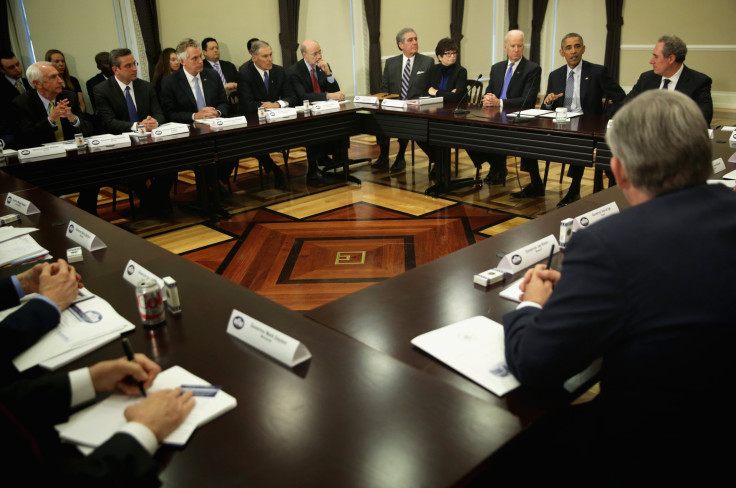Election 2016: Economy Going To Remain Top Voter Issue

WASHINGTON -- It’s still the economy. For the last two presidential elections the economy has been the top issue for voters and governors across the country don’t see that changing. Republicans and Democrats from swing states and those solidly red or blue agree not much is going to change for 2016.
“Very important,” said Democratic Gov. John Hickenlooper of swing state Colorado. “It’s still jobs. The economy is coming back, but wage growth hasn’t been sufficient enough. I think it’s going to be jobs, jobs, jobs.”
The economy took center stage at this weekend’s National Governors Association winter meeting in Washington. Dozens of the nation’s governors huddled to talk about the most pressing issue for their states. The theme was simple, the economy still needs help. And they don’t see that changing before Election Day 2016.
“Jobs, economy and education are always in the forefront,” said Missouri Gov. Jay Nixon, a Democrat. “I don’t think you’re ever going to get beyond a situation in which the dignity of a paycheck, the quality of education, aren’t the centerpiece of elections.”
Those like Florida Republican Sen. Marco Rubio, who is on the list of potential 2016 candidates, have tried to argue foreign policy could take the forefront and make governors less attractive candidates.
Rubio got some support from Indiana Gov. Mike Pence, a Republican. “There is a real possibility that 2016 could be the first foreign policy national election since 1980,” Pence said. “As we articulate an agenda for a growing economy, we also need to articulate a very clear agenda for restoring and renewing America’s position in the world.”
But Pence, who served on the House Foreign Affairs Committee when he was in Congress, is still part of the large Republican crowd being considered as possible a 2016 candidate. His time in Congress could mean he has the strongest foreign policy credentials of any of the sitting Republican governors.
Most Republicans didn’t agree.
“The economy is always important and I know it’s important in my great state of Nevada,” Republican Gov. Brian Sandoval, one of the few GOP governors not considering a 2016 White House run. “I think that will be top of mind for the people of our nation.”
In the important primary state of Iowa, which is also a swing state in the general election Gov. Terry Branstad, a Republican, said the fledgling agriculture sector is going to make the government’s effect on the economy a top issue for voters in his state.
“Agriculture is being really hurt by what the EPA [Environmental Protection Agency] is doing to the fuel standard,” Branstad said. “Agriculture income, which was good ever since we had the renewable fuel standard, now corn prices are below the price of production.”
He’s holding a meeting of the likely Republican presidential candidates in his state next month to talk about the economy. He already expects at least 10 likely candidates to attend and face questions about agriculture. “That’s an issue we’re going to be asking all the candidates and want to know what they’re going to be doing about it,” Branstad said.
For states that have had their recovery slowed, the issue could be even more pressing. “It’s always going to be the economy,” swing state Virginia Gov. Terry McAuliffe, a Democrat, said. “It’s all about the jobs, about the economy. The economy is coming back. Virginia is a little slower because of the large defense cuts and sequestration.”
It doesn’t matter if the state has suffered from a slower recovery or a speedier one, governors sense the economy still is the top voter concern.
“The economy will continue to be the issue, even in Delaware where over the last two years we’ve significantly outpaced the nation, last year tripled the pace of job growth of our neighboring states,” said Gov. Jack Markell, a Democrat. “It’s not only the number of jobs, but it’s the quality of jobs, it’s the wages. All of these issues are going to be front and center for voters.”
For governors running for president, the actual rate of their state’s recovery could play a key role in campaign messaging. The more robust the recovery, the more they can talk about it. For those who have had slow growth, it will be an issue they will have to defend.
Two of Markell’s neighbors have been represented by governors who are thinking about making a run for the White House -- New Jersey Gov. Chris Christie and former Maryland Gov. Martin O’Malley. And Christie has seen his state grow jobs at a much slower pace than the rest of the nation.
“They’re all going to lay out their arguments and the voters get to decide,” Markell said. “Those governors who have a record are going to have the strongest message.”
© Copyright IBTimes 2024. All rights reserved.





















